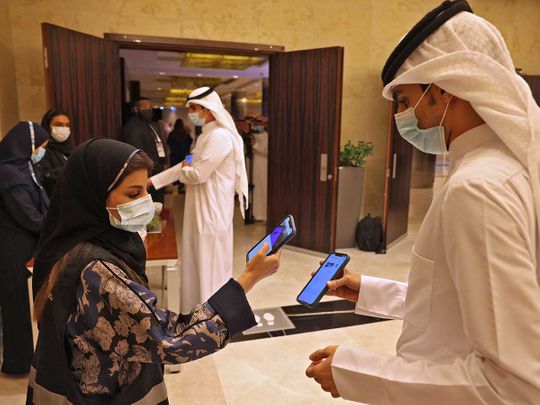
The Saudi ministry of health has been outstanding, to say the least in its battle against the COVID-19 pandemic. That is a general opinion of the more than 30 million residents of the country.
Right from the onset of the virus outbreak early last year, the ministry sprung into action and mobilised its health centers and health personnel to gear up for what was predicted to be a prolonged battle against a menacing enemy. Working alongside the ministry of interior, the health authorities quickly established protocols that governed our behaviour during the onslaught of the virus threat, protocols that today are attributed for helping keep the ratio of fatalities among the lowest tier globally.
But it did not just stop there. Mobile applications that load on your smartphones were quickly developed and large-scale social media announcements were made to implore people to upload them on their personal phones. These applications registered movements, fatalities, and later on the appointment scheduling of vaccines and the status of residents in the country following their rounds of vaccination.
From mall closures to limiting restaurants to serving takeout orders only, these initial draconian measures were necessary to guide the public towards a safer passage. Along with that, daily briefings by the ministry kept the public updated on the status of the virus in the country. There were constant reminders to protect one’s health and safety by adhering to set protocols. Saudi Arabia has observed a steady decline in the curve of confirmed infections since it first appeared more than a year ago, and most of the recently detected cases resulted from family-held social occasions, calling all the public to abide by the instructions to realise community immunity.
When the vaccines arrived, the health ministry was prepared and inoculation centers across the country quickly sprang into action. Almost 700 centers today in different regions of the country administer doses of the COVID-19 vaccine to one and all and at absolutely no cost to the individual.
Unwilling to tolerate vaccine hesitancy, the health ministry along with the government is tightening the screws on vaccine sceptics, barring them from pilgrimages and overseas travel and blocking access to universities, malls, and offices in a contentious effort to boost inoculations. From August 1, vaccinations will be mandatory to enter government and private establishments, including educational institutions and entertainment venues, as well as to use public transport. If one doesn’t carry a mobile app stating his vaccine condition then there are very limited places to venture out soon. Indeed, the ministry has been applauded on many occasions for its exemplary efforts to keep us healthy and alive.
And so, it came as a shock to many people when an announcement last month stated that the sale and serving of sheesha (tobacco-filled water pipe) were back. Now in March of 2020, the authorities had banned the banned shisha in cafés and restaurants as a precaution against the spread of coronavirus, according to media reports. Saudi Health Minister Tawfik Al Rabih was quoted at the time as saying: “Tobacco and the shisha can cause infection transmission as they change hands.”
This time around, a statement from the Ministry of Municipal and Rural Affairs and Housing said they would be reopening smoking areas and allowing restaurants and cafés to start serving shisha. To keep matters positive, the ministry added that they would conduct regular inspections to ensure compliance. Furthermore, only vaccinated customers are allowed to enter Shisha cafés, and all workers in the cafés must be immunised or present a PCR test result showing non-infection of coronavirus every seven days at the expense of the establishment where they are working.
Cafés must also ensure social distancing between tables; serving shisha will only be allowed in open areas. Only disposable shisha hoses can be used and groups more than five customers are not supposed to sit together.
Now am I the only one who is seeing something wrong in this picture. The ministry of health has gone to extreme measures to keep us alive and well, and along comes another ministry that sanctions products that are sure to do the opposite. In the last fourteen months during the shisha ban, some gave up the practice altogether and others retreated to the confines of their rooftops. Those measures have contributed to many healthy lungs.
And yet now, some pundits believe that allowing the smoking of shisha under conditions is a portent of a healthier society! On what basis was such a decision taken I wonder, for it was definitely not in the interest of the people’s health.
— Tariq A. Al Maeena is a Saudi sociopolitical commentator. He lives in Jeddah, Saudi Arabia. Twitter: @talmaeena








